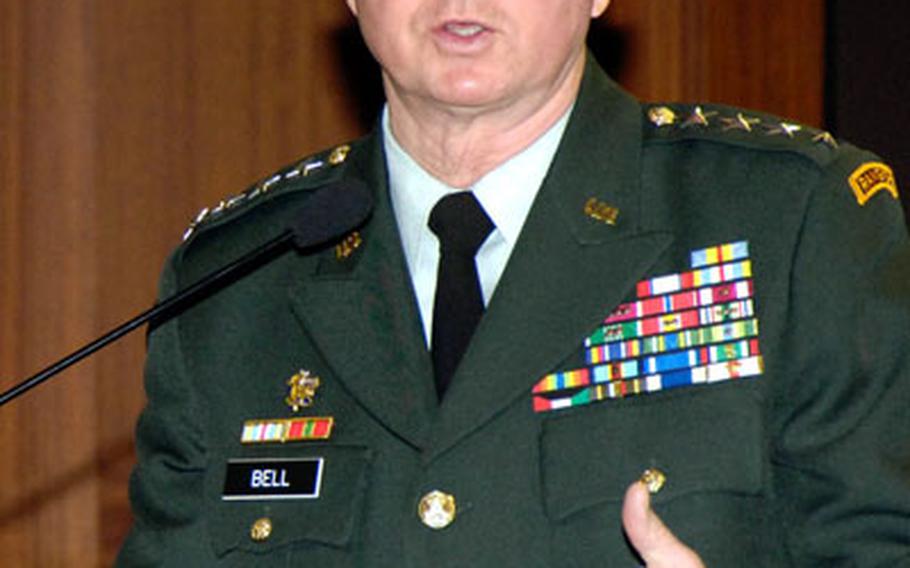
Gen. B.B. Bell answers questions during a press conference at Yongsan Garrison Tuesday morning. (Courtesy of U.S. Forces Korea)
YONGSAN GARRISON, South Korea — The South Korean government must not delay U.S. Forces Korea’s move to Pyeongtaek in 2008, USFK commander Gen. B.B. Bell said during impassioned remarks at a wide-ranging news conference Tuesday.
Bell was responding to reports that relocating USFK troops from Seoul and Area I bases to Pyeongtaek’s Camp Humphreys could be delayed until as late as 2013.
Calling USFK’s current overall living conditions and facilities “lousy,” Bell cited the need for the Camp Humphreys expansion so servicemembers could live normal lives with their families.
Currently, most servicemembers spend their time in South Korea on single, unaccompanied tours.
“We agreed in 2004 to get this done by 2008,” Bell said. “The problem is, pretty quick in the future all that could stop because of either fiscal constraints … or political decisions. And I will fight this.”
Bell also expressed surprise that the South Korean government had not consulted with USFK before announcing the potential relocation delay to South Korean media.
“This was news to me and not at all reflective of the agreement we have with the Republic of Korea,” Bell said.
A South Korean Ministry of Defense spokesman declined to comment on Bell’s remarks Tuesday.
Bell also said that South Korean base worker layoffs are a possibility because of a funding shortfall, though he called it “extremely problematic because they contribute to my readiness.”
Last month, South Korea agreed to pay about $789 million to share costs of USFK’s operations with the U.S., and the same amount with an inflation adjustment in 2008. That figure is significantly below USFK’s minimum operating needs, Bell said.
“I need the money from the two governments to execute what they told us to do,” Bell said.
Contracts with South Korean businesses and some construction projects also could be cut, he said.
When asked about recent reports that North Korea might be readying another nuclear test, Bell declined to discuss current intelligence data. However, he said he expected North Korea to test another weapon “someday.”
“They’ve self-proclaimed that they have nuclear weapons and that’s plural,” Bell said. “They have tested one and, therefore, there’s no reason to believe that at some time in the future, when it serves their purposes, they won’t test another one.”
He then reiterated what he asserted following the first nuclear test: Should North Korea ever attack the south, the Combined Forces Command would respond quickly and win decisively.
Bell also addressed wartime troop control and the future of the United Nations command, both of which he leads.
The issue of returning wartime troop control to South Korean leadership has been hotly contested. Many of the South Korean government’s liberal elements have called for a swifter return of control, while conservatives and several former army generals are opposed to transferring control.
After President Roh Moo-hyun asked for troop control by 2012, U.S. officials said the transfer could be completed as soon as 2009.
Whatever the outcome, Bell called for continuity, saying, “Whoever is in charge during an armistice probably ought to be in charge during war, so there is a seamless unity of effort for military operations.”
Later, from about 2 to 4 p.m., about 200 demonstrators led by the Korean College Student Federation protested outside Yongsan Garrison’s main gates, South Korean police said.
The group dubbed the event the “2007 anti-America, anti-war rally,” police said. The protesters then moved to nearby Hyochang Park for a rally.
Five hundred riot police were sent to the scene, police said. No one was reported injured.